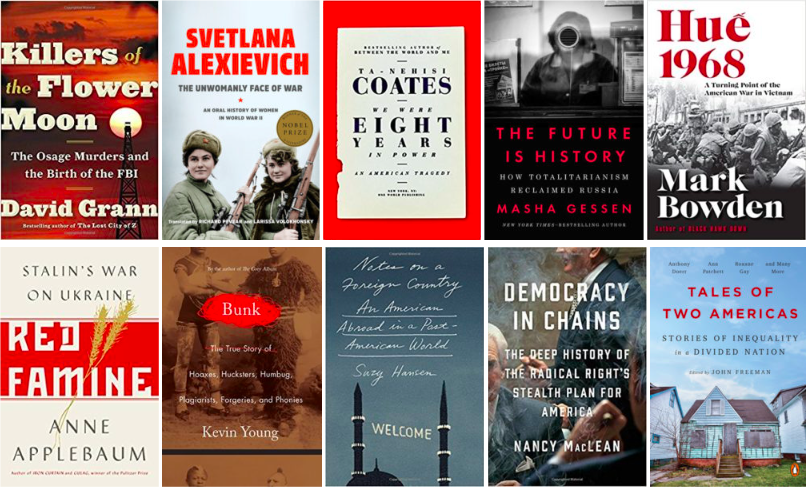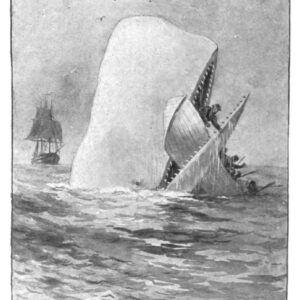
1. Killers of the Flower Moon by David Grann
(18 Rave, 4 Positive, 1 Mixed)
“…the strangest, most horrific story that Grann has told … Grann folds it, neatly, into three hundred pages. But he also makes something much more out of the material—something deep, devastating, and almost unbearably sad. On the one hand, he takes in the entirety of what was done to the Osage and, by extension, to the American Indian. On the other, he paints intimate portraits of men and women who’d murder their husbands, their wives, their own children … What we’re left with are circles of complicity that widen and widen until, terrifyingly, they grow to encompass the reader as well.”
–Alex Abramovich (Bookforum)
*
2. The Unwomanly Face of War by Svetlana Alexievich
(10 Rave, 3 Positive, 2 Mixed)
“This is a tough read, both emotionally and intellectually. But it would be hard to find a book that feels more important or original. There’s a visceral anger in Alexievich’s introduction that’s rare in any history book … Tempting though it is, this is a difficult book to read in one gulp. Alexievich presents this as oral history: fragments of conversation that are not always rooted in specific events and don’t carry the dates of battles next to them. This is an incredibly powerful way of bringing history to life. These women spoke to her as friends and treated her more as confessor than journalist and historian … Her achievement is as breathtaking as the experiences of these women are awe-inspiring.”
–Viv Groskop (The Guardian)
*
3. We Were Eight Years in Power by Ta-Nehisi Coates
(10 Rave, 2 Positive, 1 Mixed)
“The essays gathered in Ta-Nehisi Coates’s latest book, We Were Eight Years in Power: An American Tragedy, demand that we see the black-American experience as not incidental but central to the founding stories that makes America possible … Coates’s writing is consistently nuanced and precise, always limited to what the writer can pull out of his own story, out of another’s, out of the archives, or out of a database …provide a too-rare peek into the processes of a first-rate mind conversing with itself and of a man writing his way to greatness … This book will not provide all of us with resolutions to the United States’s woes. But it is one essential modern work for a complete understanding of the American democratic process, because it is central to American storytelling.”
–Rahuldeep Gill (The Los Angeles Review of Books)
*
4. The Future is History by Masha Gessen
(9 Rave, 4 Positive, 2 Mixed)
“The Future Is History: How Totalitarianism Reclaimed Russia is a remarkable portrait of an ever-shifting era, as told through the experiences of four people who were born in the waning years of the USSR …two men and two women at the heart of this rich and deeply reported book are neither famous nor blessed with unique talents. But taken together, their life stories form an extraordinarily detailed picture of the country’s fraught recent past … Gessen weaves her characters’ stories into a seamless, poignant whole. Her analysis of Putin’s malevolent administration is just as effective … Her ambition has resulted in a harrowing, compassionate and important book.”
–Kevin Canfield (The San Francisco Chronicle)
*
5. Hue 1968 by Mark Bowden
(8 Rave, 5 Positive, 1 Mixed)
“Mr. Bowden treats both sides with impeccable fairness and shows the bravery and cruelty of each. There is no ‘enemy side,’ no sinister force of the kind that lesser journalists and historians sometimes use like the antagonist in a novel to hold the reader’s attention … Hu? 1968 is also an exploration of what is common to all wars: humankind’s capacity for violence, cruelty, self-sacrifice, bravery, cowardice and love. Mr. Bowden undertakes this task with the talent and sensibility of a master journalist who is also a humanist and an honest man … To understand what it is to be human, you must understand war, which is unique to our species. In Hu? 1968, we read about humanity placed in a crucible, out of which comes both refined steel and slag. Here the best and worst of human behavior is exposed in glaring light.”
–Karl Marlantes (The Wall Street Journal)
*
6. Red Famine: Stalin’s War on Ukraine by Anne Applebaum
(9 Rave, 3 Positive, 1 Pan)
“..a richly detailed history of the great famine … Applebaum has painstakingly mined a vast array of sources, many of which were not available when the historian Robert Conquest wrote his pioneering history of the famine, The Harvest of Sorrow, 30 years ago: oral histories of survivors; national and local archives in Ukraine, including those of the secret police; and archives in Russia, which opened in the 1990s and then partly closed again, but not before various scholars published collections of documents from them … It is a reminder of the lengths that demagogues will go to in order to suppress or distort the truth — something no less a problem in many a country today than it was in the Soviet Union more than eight decades ago.”
–Adam Hochschild (The New York Times Book Review)
*
7. Bunk by Kevin Young
(5 Rave, 7 Positive, 2 Mixed)
“Young is a fine poet and his often recursive, textured prose is the perfect delivery for the cyclical nature of literary lies … Bunk is teeming with these types of insights. As a poet and historian, Young has the particular skill of seeing the unseen. He understands that at the heart of every lie is a good, perhaps great, story. Often the act of story is the act of persuasion, hypnosis, delusion. For better or worse, we love to be lied to if the song sounds good … Bunk contains a laundry list of charlatans, including Rachel Dolezal, Stephen Glass, James Frey, and Laura Albert. But what is most powerful is Young’s examination of American lies about race … Young might just have written the most important book this year. Sadly, his book suggests that we might make the same statement for 2018—and the next year, and the next.”
–Nick Ripatrazone (The Rumpus)
*
8. Notes On a Foreign Country by Suzy Hansen
(6 Rave, 5 Positive)
“…a searching and searing book … Hansen writes with both authority and humility and, occasionally, with sharp beauty … Some of the book’s strongest passages involve her rigorous interrogation of the notion of American exceptionalism, of America as the pinnacle of a historical narrative of progress, which she realizes she has internalized … Also fascinating is the author’s evolving understanding that despite her faith in her journalistic objectivity, the myths she has absorbed affect the way she tells stories from around the globe … a testament to one journalist’s courage in digging deep within herself to understand the real story and to make sure she gets it right.”
–Barbara Spindel (The Christian Science Monitor)
*
9. Democracy in Chains by Nancy MacLean
(4 Rave, 5 Positive)
“All of this, so plainly in view but so strangely ignored, makes MacLean’s vibrant intellectual history of the radical right especially relevant. Her book includes familiar villains—principally the Koch brothers—and devotes many pages to think tanks like the Cato Institute and the Heritage Foundation, whose ideological programs are hardly a secret. But what sets Democracy in Chains apart is that it begins in the South, and emphasizes a genuinely original and very influential political thinker, the economist James M. Buchanan.”
–Sam Tanenhaus (The Atlantic)
*
10. Tales of Two Americas, Ed. by John Freeman
(5 Rave, 1 Positive, 2 Mixed)
“The anthology examines what Freeman describes as ‘a lurking feeling of displacement in America,’ through thoughtfully arranged reflections on the way so many of us feel disconnected from ourselves, from others and from place … a dazzling assemblage of emerging and established writers offers insights that are straightforward or subtle, but always compelling … Each contribution stands out. Each voice is unique. The only common threads in the collection are theme and excellence … This anthology is spectacular and devastating and provocative.”
–Michael Kleber-Diggs (The Minneapolis Star Tribune)


